It’s that time of the year again. You have just passed your pre-university exams, and now with so many turmoils brewing across the world, you decided to take up a Law Degree or be a Lawyer. This article is jointly written by few of the brothers at BrainyLaw, namely Weera, Ivan Fredric Yun and Yeoh Kai Shin.
This article will look to provide tips to Local and Private University students on how to pass their LL.B and CLP or BPTC exams. The tips should be applicable across the board. If Weera can pass his LL.B and CLP without a single failure in 4 years, so can you.
Prologue
Weera still remembers how he felt 8 years ago when he entered Law School. He was very enthusiastic about the prospect of becoming a Lawyer. He has a dream to one day join a prestigious firm, working for prestigious Partners. The dream remained until today.
Embarking on a Law Degree and/or CLP this year in light of the Covid-19 Pandemic is akin to opening Pandora’s box, many uncertainties and learning difficulties may occur due to the disrupted learning cycles and processes. Moving forward, there is still much left in the tank for law students to embrace the upcoming challenges.

Now before we begin, here are the 6 realities that students need to be mentally prepared of:
a) Not everyone will make it.
It’s a battle of the fittest, a marathon of grit. Your best friend who embarked on the same journey as you may well not be there at the finishing line. Getting LL.B and/or CLP is a form of preliminary elimination process in determining whether you are fit to be a Lawyer. Do note that you are still not fit to give any legal advice at least until you are doing your pupilage / chambering!
Not all dreams come true, but so do nightmares.
b) LL.B is not difficult at all, so is CLP / BPTC.
Notwithstanding my first point, any Tom, Dick & Harry on the road may have an LL.B and/or CLPs or BPTC behind their names. Delete any negative thoughts that the exams is hard or impossible to pass.
Anyone who tells you that the exams is incredibly hard and impossible to pass, are the negative people whom are doomed to fail from the get-go, and will only try to drag you down with them. AVOID these people at all costs.
c) There will definitely be problems along the way.
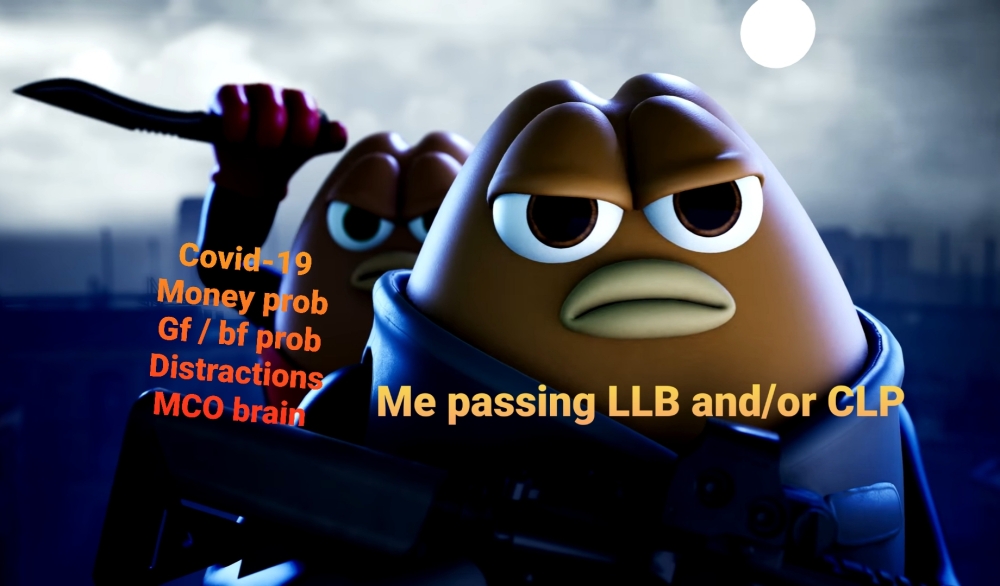
- This meme will be stolen.
At best, it will take at least 4 years in total. There will be distractions and problems, as can be seen in the meme above.
d) You need to work smart AND hard to succeed.
Having the former characteristics is better than the latter, but having both distinguishes you from the lower echelons. Just going to class aimlessly and feeling good about sitting at the lecture hall without really absorbing anything, will not do you any good.
Getting them all right in one go requires strategy, as we shall explore later.

e) Just because you are a straight A student, doesn’t mean you make the cut automatically (and vice-versa!)
I’ve seen this situation too many a times, where students harped too much on their past successes, only to fall prey to such ignorance. It’s often the underdogs (or individuals with the positive mindset) whom rose from the ashes of failure and perform a hard reset, makes it to the end. We personally have seen a student with only 1A in SPM acing LL.B exams way better than straight A students, though this is not a general rule.
I would like to remind every law students reading this, that you are starting afresh in this journey.
f) Choose your vice(s).
It’s okay to indulge on them as long as you are not off-track. BrainyLaw’s Ivan and Mei Xian loves coffee.
Now let’s move on the things you need to pass your LL.B exams and CLP exams (in one go!)

10 things you should do to pass (or study) LL.B and CLP
1) Choosing the right institution and attend resourceful lectures

Doing this right could be a game breaker, even for students whom are independent learners like BrainyLaw’s Mei Xian.
For private university students, the choice is obviously more flexible and the freedom to choose is yours. The key would always to be choosing universities with experienced lecturers, not universities which are ‘testing the waters’ or just provide law courses because they are obliged to.
Access to resources may differ greatly from university to university, so do choose one that offers greater resources. Do DM us on Facebook or LinkedIn for list of such universities, if needed. Few tips on this are:
a) Attend classes as much as possible, especially when you are new to the subject. Do consider skipping sessions which are unresourceful.
b) Ask questions to your lecturers and peers. Do not be afraid to ask questions as this is a learning process.
c) Learn from your mistakes. Submit as many assignments or written works to be assessed by your lecturers.
d) During and Post MCO, familiarize yourself with the prospects of attending more online classes, and even the possibility for an online written examinations!
e) Keep in mind that your aim should always be that 2nd Class Upper Grade or 1st Class Grade! This can be career changing.

Ivan is of the view that whoever commence their degree in overseas, your first year should be a year where you really experience the “uni life”. Just don’t fail your exams. And when it comes to your 2nd year and 3rd where your results matters into your overall degree, you go full on rampage mode all the way for that 1st class. For UK Transfer programmes (i.e. UKT), the 2nd year is the most important year, as that allows you to credit transfer into the top unis that institutions like BAC allows you to go.
2) Study smart – have a study plan and test out your knowledge, alone and with friends.
It’s always good if you have a study buddy with you, who share the same goal and aspirations of passing the exams like yourself.
Discuss with your friends on the applicability of the law, solve hypothetical questions together, and keep the engagement going. You do not have to be passionate about the Law to pass your exams, but the interest will sure be great to keep you going. Keep in mind though you may still not be able to assist your neighbours with their legal problems at least until you are doing your pupilage / chambering.
There is no set rule of how many hours you need to study. Instead, set goals based on your abilities to understand the subject matter and capability of answering the exam questions. Your study plan should revolve around this 2 aspects.
We recommend using the Pomodoro Revision Technique. In essence, it involves setting a timer to commit all your focus towards the study objective within the set timer. You can view the more in-depth video here:
3) Be prepared for your exams strategically and practice proper prioritization.
For most LL.B exams and (all) CLP exams, your life would very much depend on how well you fared during your 3-hour exams. You may have studied the whole year, but that wouldn’t matter if you don’t prepare well on the big day itself.
Below are few tips:
a) 2 or 3 months before the exam, shift all your focus on doing past year questions. At that point of time, it is too late to happily flip your textbooks. By practicing to answer past year questions (in full writing if you can), you hit 2 birds in one stone.
b) Compile your set of revision notes. These are the notes that you will use and refer to few months before the exam.
c) Check for any case updates on the law, try to incorporate the changes into your answers.
d) Physical exams may still be a possibility, as social distancing is present in exam halls even before MCO. That being said, it’s always good to be mentally prepared for online examinations, as have been carried out by certain institutions.
e) You probably would have known this already, but try not to procrastinate your studies until the last minute, beyond salvation. Come exam season, there is no more time to flip your textbooks. Ditch them and focus on doing questions.
f) Write short notes in small sections, use a specific highlighter colour for a relevant part. For example, orange is cases, rules, yellow is principle etc
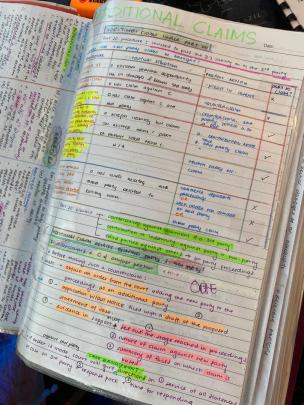
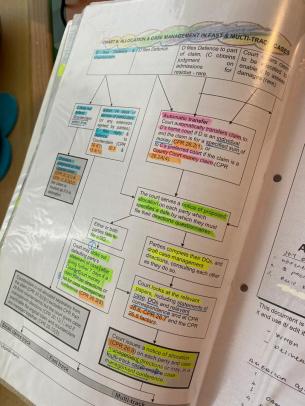
Few of Ivan’s notes back then. Do resist the temptation of making it a colouring exercise.
As a visual learner Ivan uses mind maps to take down notes. Use crunch notes and memorise it. Use flash cards if you can as seen in the video below – this is near the exam.
Last but not least, this is the legit combo. Use acronyms of the principles and make a word or drawing that you can remember For example Ivan drew a NNET (because of the principles that start with N.N.E.T).
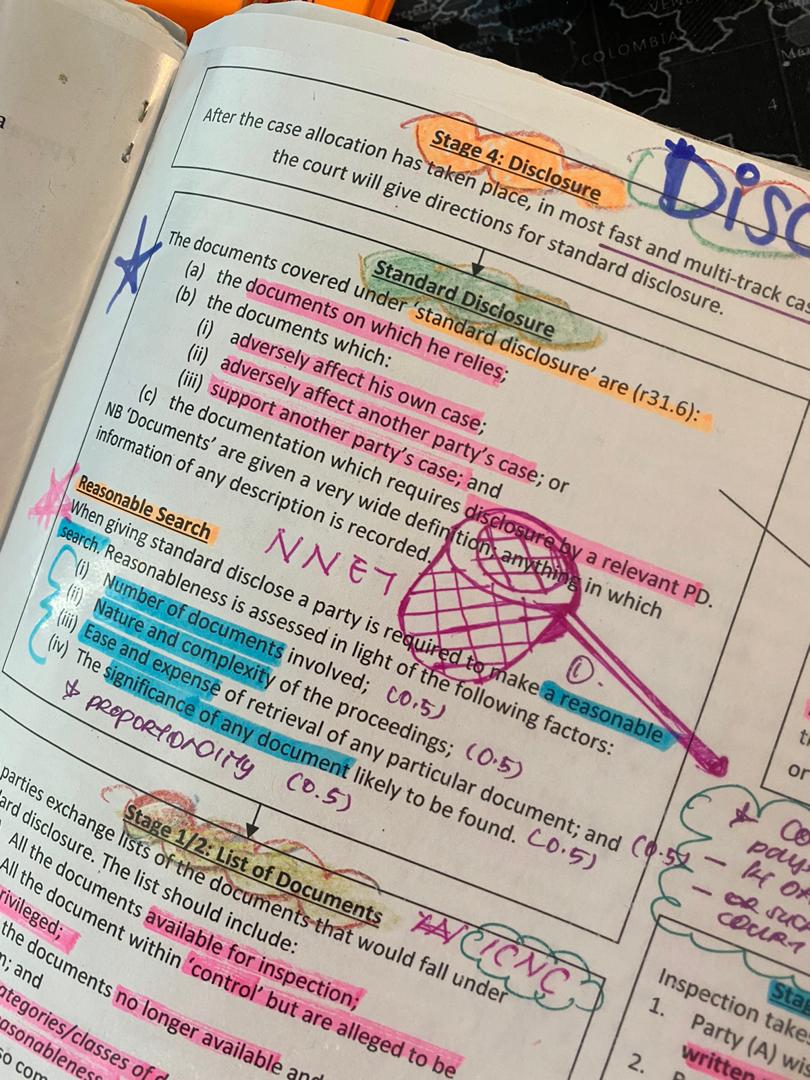
For LLB, don’t study hard but study smart (again we are stressing this). For bulky topics, don’t spend your time reading the whole text book, just master a set number of topics that you know (because the lecturer gives OBV tips) and make sure you cover those topics and answer them in exam. For BPTC, it is the opposite, as you have to cite in verbatim therefore you just memorise the whole white book.
All lawyers were once students as well. We know how it felt. We lived to tell the tale.
This seems like a stupid thing to tell, but for the new law students, you do not need to fully cite the name of the cases in your answer nor you need not always cite their dates, unless for strategic purposes.
For those who passed LL.B, a far greater challenge would pose itself in the form of CLP or BPTC. In general, CLP is way bulkier, and this alone forms the reason for such challenge existing. For a way more in depth perspective on how to pass CLP, you can read the first ever article here (on what to expect) and here (on things I did wrong and right) on BrainyLaw (yes it’s history indeed!).
3) Stay healthy and know when to take break
As BrainyLaw’s Ivan favourite quote goes, “badan cergas otak cerdas“.
Your health is really important, especially during when the time comes for you to sit for that 3 hour exams. Take a break when you need to, and don’t overwork yourself.
We cannot stress how important this aspect is. Kai especially understands that a lot of students tend to neglect this part of their lives. But taking some time to work on and care for your mental and physical health goes a long way. The BPTC / CLP are very mentally demanding courses, so to stay on top of your game, this should be at the top of your list.

4) Invest in books and / or resources
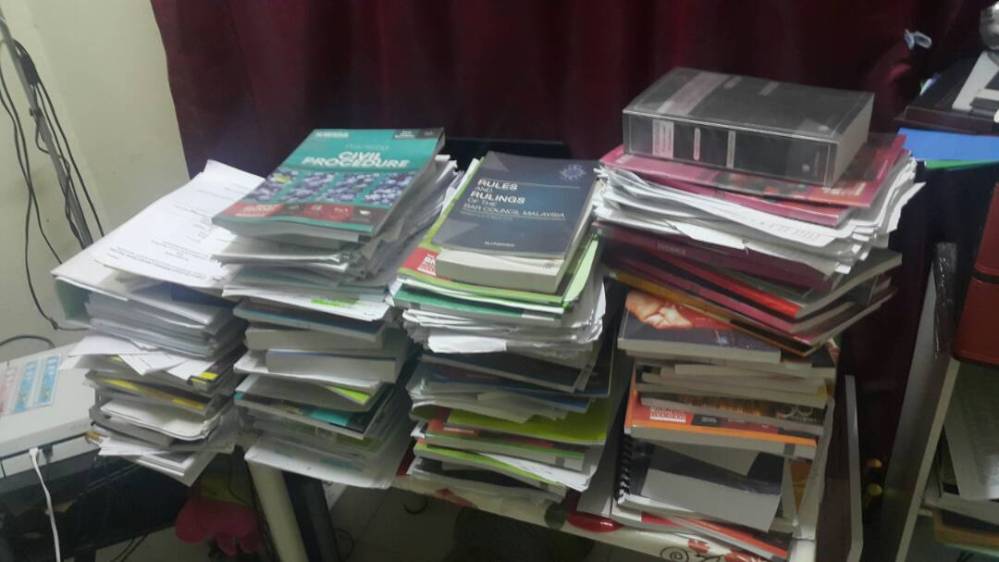
There are many things you should save your money on as a student, but not books.
Books that I recommend (especially for private university students) would include QnA series, and basically text books that you are personally comfortable with.
5) Utilize your legal research database
This researching or skill to use research databases such as Westlaw, CLJ or Lexis Nexis is very useful for your course of study, and also for your career as a Lawyer later on.
The aim of using these databases is to look out for case judgments, and actually reading them.
Kai highly recommends curating your own ‘database’ for past research assignments that you have completed, because that was what he did (he literally used a pendrive) and he found that it really helped him in looking up a particular area of law as swiftly as possible.
6) Keep yourself updated with changes
Law is constantly evolving. The last thing you would want to do is rely on outdated cases to support your case (even lawyers fall prey to this sometimes). For Law Students, this can usually be done only by using the legal research database, or relying on your lecturer’s notes.
7) Join mooting and/or extra-curricular activities which are related to Law
For those of you who are new, mooting is like a debate, but more similar to a Court Setting, with more dignified presentations and respectful demeanour.
Mooting will not only sharpen your advocacy skills, it will also boost your understanding of the law. It may also help boost your career prospects in the future. I’ve seen mooters whom are more capable than a few people I’ve met in Court.
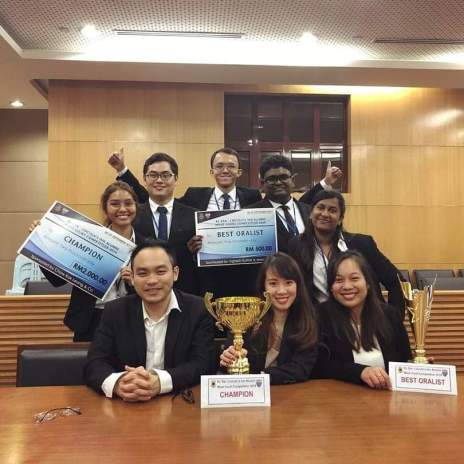
Alternatively, you can also join events or programmes organised by the State Bar i.e Kuala Lumpur Bar / Selangor Bar. Under the KL Bar, you can be a Student Ambassador for the KL Bar, whereby you will be exposed first hand to contacts to members of the profession and many more chances to establish connections for yourself.
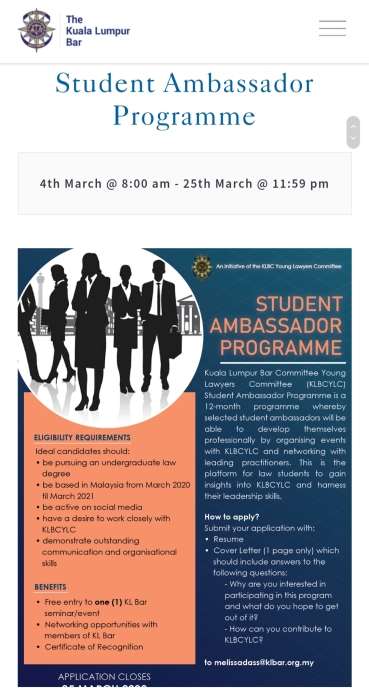
There are many other extra-curricular things you can get involved in, but try to keep it to the ones that are mentioned above.
8) Motivation for success


Individuals may value other things in their lives such as wealth, health, respect, morality, or love for the law and to find the joy and passion of what you are doing and do your best in it. You must be fan and have a passion for the law. Having passion is different from being a student in one important respect: Enthusiasm is given. Passion doesn’t need to be goaded into doing our homework. To have passion means we will (enthusiastically) devote hours, weeks, and years to acquire the necessary knowledge and skills by studying, practising, reading, writing and rewriting.
Personally for Weera, the key is not being able to afford any failures. Weera came from an average family, supported by his aunt and single mother. One failure will cost them dearly. This fear will usually brings the best out of a person.
At one point in Weera;s life, he was kicked out of his CLP class as he could not afford to pay the fees on time. It was a struggle to get back to his study vibes. His momentum and spirit was severely demoralized. The humiliation did not help much.
When he enrolled back to the university, he realized he had gone far behind as compared to his comrades. It was only 5 months before the CLP exams. He then enroll to revision classes at another university, with the financial help from his family coming in at last.
He reminded himself of the dream that he mentioned earlier, to work at a prestigious firm. He once made a firm’s logo as the wallpaper for his phone screen, reminding himself this his goal, and that he’s not too far away from it. In the end, he passed the exams in one shot, though the dream remains one.
Always remember, failure isn’t the end of the road. As for Kai when he was doing the BPTC, he dealt with a lot of personal issues and obstacles, which caused him to fail 50% of his papers, had a major setback with a total of 1.5 years. All his friends got called to the Bar almost a year before he did. It was a tough road, but the journey taught him a lot about what it means to be strong and the true value of perseverance. He continued working as hard as he could and he tweaked my study methods (study smart > study hard), and he made it at the very end. However your path may unfold, embrace the challenges and never take it for granted. For all you know, it is meant to teach you something. That’s how he felt about his journey, and hopefully it’s the same for you as well.
Moral of the story – motivation to succeed can make wonders!
Weera listens to these songs when he’s down, preparing for possible comebacks:
a) Butterfly : https://www.youtube.com/watch?v=mDwzFi0gc0s
b) Brave Heart : https://www.youtube.com/watch?v=PEWtMVRbBk8
This topic is never ending. Every person adapts differently. What makes the difference is your desire to succeed, and what you do to make it a reality.
Conclusion Welcoming Note
Writing a conclusion at the end of every article is too mainstream. Instead, let me welcome you to this journey that you will embark in. You will face difficulties in this journey, but it does not have to be all by yourself.
For those reading this, Weera, Ivan & Kai Shin as well as the 12 other family members of BrainyLaw, awaits you to join us and our fellow lawyers at the finishing line, hopefully one day as fellow brethren of the Bar.
Weera Premananda @ Weera Soon Jin Xue, together with his brothers Ivan Fredric Yun and Yeoh Kai Shin.
Advocate(s) & Solicitor(s) of the High Court of Malaya
All evil escaped to the world when Pandora’s box was opened, but there’s one thing that remained in the box with us. It is called Hope.





Great content. Very encouraging and inspiring. Definitely a morale booster during this difficult time. Thanks for sharing. 🙂
LikeLike